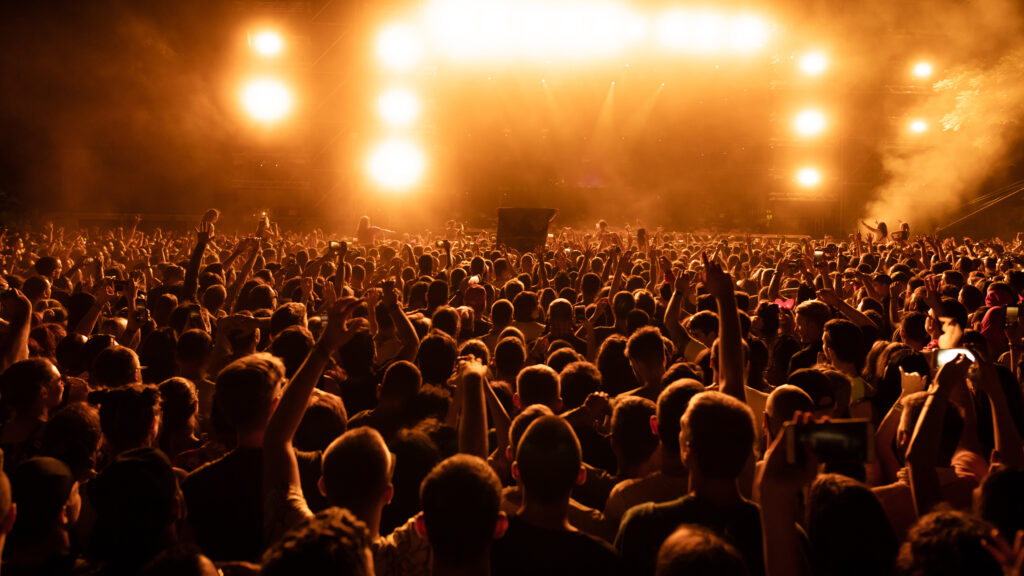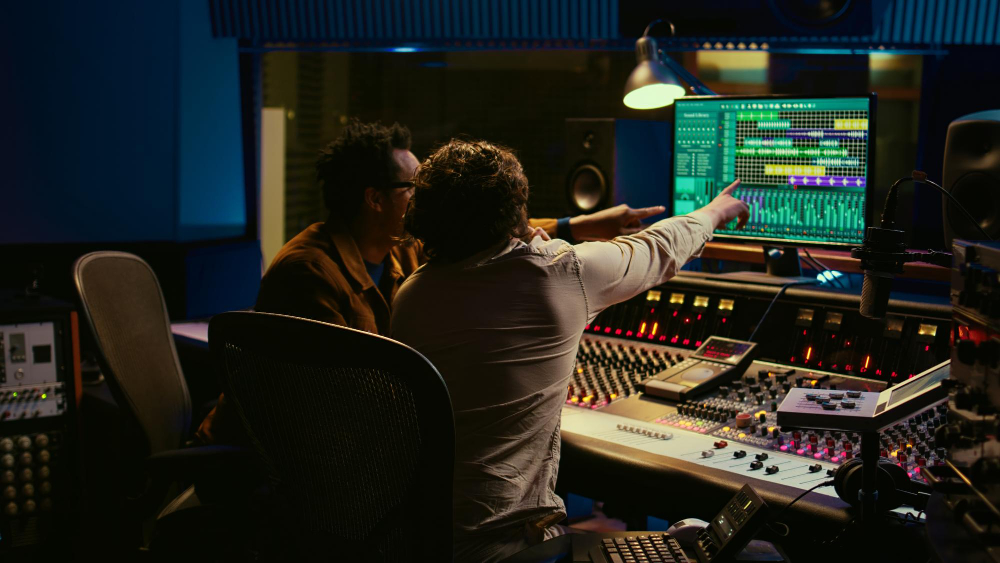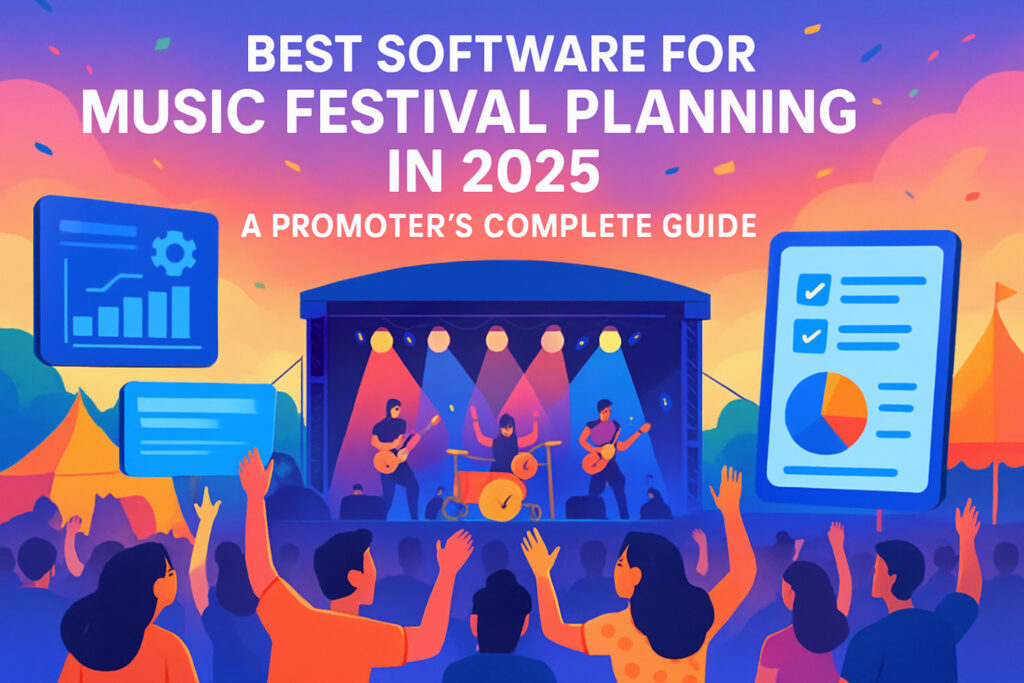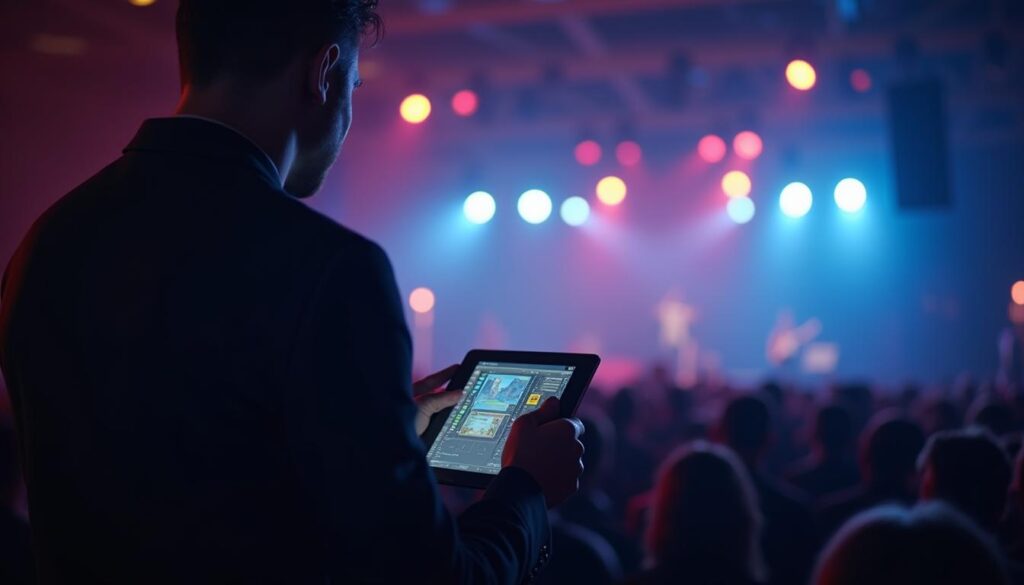
Live Music Industry Trends: 10 Trends Shaping the Future
The live music industry continues to evolve at a rapid pace, embracing innovation and responding to changing audience expectations. As we wrap up 2024 and move into 2025, the sector is reimagining itself, pushing boundaries, and creating new paradigms for live music experiences.
The global live music market has shown impressive growth, with revenues reaching over 33 billion U.S. dollars in 2023, a 25 percent increase from the previous year. Industry projections suggest this upward trajectory will continue, potentially surpassing 50 billion dollars by 2030.
This robust growth sets the stage for exciting developments in the coming years. Before we dive into the details, here’s a quick look at the key live industry music trends we’ll discuss:
- Hybrid Events: Blending physical and digital experiences to reach wider audiences.
- Eco-Conscious Concerts: Prioritizing sustainability in all aspects of event production.
- AI-Enhanced Experiences: Leveraging artificial intelligence for personalization and immersion.
- Intimate Venues and Exclusive Experiences: Catering to the desire for authentic, up-close performances.
- Virtual Realms and the Metaverse: Exploring new frontiers in digital concert spaces.
- Music Tourism: Turning concerts into destination experiences.
- Data-Driven Personalization: Tailoring every aspect of the concert experience.
- Niche Festivals: Focusing on specific genres or themes to create deeper connections.
- Enhanced Safety and Wellness: Expanding the concept of attendee well-being.
- Blockchain and NFTs: Redefining ticketing, memorabilia, and fan engagement.
These trends reflect an industry that’s not just growing but actively shaping its future. They represent a convergence of technological innovation, changing consumer preferences, and a renewed focus on sustainability and personal well-being.
10 Live Music Industry Trends That Are Shaping the Music Experience
For artists, these trends offer new ways to connect with fans and express their creativity. For promoters and venue owners, they present opportunities to create more engaging, efficient, and profitable events. And for fans, these developments promise richer, more personalized, and more diverse live music experiences.
As we explore each of these trends in depth, we’ll see how they’re redefining what’s possible in the world of live music. From stadium-sized spectacles to intimate, tech-enhanced performances, the future of concerts and events is more exciting and varied than ever before. Let’s dive deeper into each of these transformative trends shaping the future of live music:
- Hybrid Events: Bridging Physical and Digital Realms
The concept of hybrid events has evolved from a pandemic necessity to a strategic opportunity. These events combine in-person attendance with virtual participation, offering unprecedented flexibility and reach.
Artists are experimenting with simultaneous physical concerts and high-quality live streams, complete with interactive elements for online viewers. Some are even creating differentiated experiences for in-person and virtual attendees, leveraging each medium’s unique strengths.
A recent Eventbrite survey revealed that 69% of eventgoers prioritize experiences over material possessions when it comes to spending their disposable income. This preference for experiences, coupled with the convenience of digital access, is driving the popularity of hybrid events.
- Eco-Conscious Concerts: The Green Revolution
Environmental sustainability has become a central concern in the live music industry. Artists, promoters, and venues are implementing innovative solutions to reduce their ecological footprint.
“Eco-tours” are gaining traction, featuring renewable energy-powered stages, plastic-free venues, and carbon offset programs. Some festivals are partnering with environmental organizations to create educational experiences alongside the music.
The trend extends to merchandise, with a shift towards sustainable materials and even digital-only collectibles. As environmental consciousness grows, sustainability practices are becoming a key factor in fans’ decision-making process when choosing which events to attend.
- AI-Enhanced Experiences: Personalization at Scale
Artificial Intelligence is revolutionizing various aspects of the live music experience. From personalized event recommendations to AI-generated visuals that respond in real-time to music, the technology is creating more immersive and tailored experiences for attendees.
Some venues are employing AI-powered chatbots to provide instant, personalized assistance to concertgoers. Artists are exploring AI’s creative potential, using it to generate unique visual effects or even to compose elements of their live performances. AI is contributing the pre-show creative process, offering artists innovative tools for composing and arranging music, potentially transforming how performers prepare for live events.
The technology is also being harnessed to gauge audience engagement during concerts, enabling real-time modifications to performance elements like lighting and song selection, ensuring each show is a bespoke experience that resonates with the specific crowd in attendance.
- Intimate Venues and Exclusive Experiences
While mega-tours continue to break records, there’s a parallel trend towards more intimate, exclusive experiences. Pop-up concerts in unexpected locations, secret shows announced via social media, and limited-capacity events in unique venues are gaining popularity.
These smaller events cater to fans’ desire for authentic, up-close experiences with their favorite artists. Some promoters are leveraging technology to enhance these intimate gatherings, creating high-tech, immersive environments that belie the small scale of the venue.
- Virtual Realms and the Metaverse
The concept of virtual concerts has evolved beyond simple live streams. Artists are creating avatar versions of themselves to perform in digital spaces, allowing for fantastical performances unbound by physical limitations.
Gaming platforms like Fortnite and Roblox have hosted successful virtual concerts, pointing to a future where music, gaming, and virtual reality converge. As VR technology becomes more accessible, we can expect to see more innovative uses of virtual spaces for music performances and fan interactions.
- Music Tourism: Experiences Beyond Borders
Music tourism is experiencing a resurgence, with fans increasingly willing to travel for unique concert experiences. Cities and countries are capitalizing on this trend, developing music-focused tourism initiatives that showcase their cultural heritage alongside contemporary artists.
From K-pop experiences in South Korea to jazz tours in New Orleans, music tourism is becoming a significant economic driver for many regions. Festivals are expanding their offerings to include local experiences, turning weekend events into week-long cultural immersions.
- Data-Driven Personalization
The live music industry is leveraging data analytics to create more personalized experiences for fans. From customized setlists based on local streaming data to personalized merchandise recommendations, data is being used to tailor every aspect of the concert experience.
Eventbrite notes that a significant majority of event organizers, 64%, believe that using direct messaging to engage with attendees is crucial for event success. This trend towards personalized communication is extending to every touchpoint of the concert experience, from ticket purchases to post-event surveys.
- Niche Festivals and Genre-Specific Events
While large, multi-genre festivals remain popular, there’s growing interest in more focused, niche events. These could range from festivals dedicated to specific subgenres of electronic music to events celebrating the music of a particular decade.
These niche events often include educational components, such as workshops or talks, creating a more immersive experience for attendees. They cater to fans’ desires for deeper engagement with their favorite music and like-minded community members.
- Social Media: Evolving Beyond Traditional Engagement
While social media has long been a staple in music marketing and fan engagement, its role in the live music industry continues to expand and evolve. As platform popularity shifts and changes, artists and promoters must continue to explore new digital avenues for connection.
Emerging platforms are becoming central to the concert experience, offering innovative ways for artists to interact with fans before, during, and after events. From influencing setlists through real-time polls to providing exclusive behind-the-scenes content, social media is creating more immersive and participatory concert experiences.
Eventbrite’s study found that more than half of event organizers believe that using new tech is “extremely important.” This includes leveraging social platforms for virtual meet-and-greets, integrating event apps, and even augmented reality experiences tied to live performances.
As we approach 2025, we can expect to see social media’s role in live music continue to evolve, with a focus on platforms that offer more interactive and personalized experiences for fans.
- Blockchain and NFTs: Redefining Ownership and Access
While the initial hype around NFTs has settled, the technology is finding practical applications in the live music industry. Blockchain is being used to create verifiable, secure tickets that combat fraud and scalping.
Some artists are offering digital collectibles as part of VIP packages or as exclusive event memorabilia. Blockchain technology is also being explored for royalty distribution and fan engagement, potentially reshaping the economic model of live music.
As we look towards 2025, it’s clear that the live music industry is in a period of exciting transformation. These trends reflect an industry that’s not just recovering from recent challenges but actively reimagining its future.
Ready to Rock the Future of Live Music?
The rapid evolution of the live music industry presents both challenges and opportunities for event organizers. Staying ahead of these trends and managing your events with precision can transform a good event into an unforgettable experience. This is where Prism comes in.
Prism is a comprehensive digital music management platform designed by industry professionals who understand the unique demands of live music events. Whether you’re organizing intimate gigs or large-scale festivals, Prism offers the tools and flexibility you need to thrive in this dynamic landscape and equips you with cutting-edge solutions to streamline your processes and capitalize on emerging trends. Ready to lead the charge in the changing world of live music? Schedule a demo with Prism today and discover how we can help you manage every aspect of your events as you orchestrate the future of concert experiences. Don’t just keep pace with the industry—set the rhythm with Prism.

Matt Ford is the founder and CEO of Prism.fm, an Austin-based software company revolutionizing live music event management. With a background in entrepreneurship and a degree from the University of Wisconsin-Madison School of Business, Ford combined his self-taught coding skills with firsthand experience as a concert promoter to address the inefficiencies he observed in the industry. In 2018, he launched Prism.fm, an all-in-one platform designed to streamline operations for venues, promoters, and agencies by replacing cumbersome spreadsheets with integrated tools for booking, financial tracking, and contract management. Under his leadership, Prism.fm has grown significantly, achieving $3 million in annual recurring revenue post-COVID and securing over $15 million in funding . Ford’s commitment to building user-centric solutions has positioned Prism.fm as a trusted partner for over 1,500 venues and promoters worldwide.



